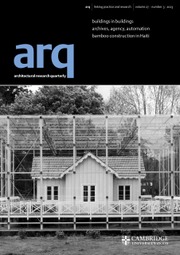Article contents
The cartographic and the geopolitical: advocating a new agenda in architectural thinking and research
Published online by Cambridge University Press: 04 April 2018
Extract
Today, there is an increasing use of terms such as ‘transnational architecture’, ‘architecture beyond Europe’, ‘architecture of China, Japan and Korea’, ‘China in Africa’ and ‘Socialist architecture in Africa’. This signals a change in the basic outlook in thinking and research around architecture towards a problematic concerning geography and geopolitical relations. Michel Foucault, as early as 1967, had already said that ‘history’ was being replaced by ‘geography’, and a historical outlook on an endless timeline was being replaced by a new awareness of a finite world, of a world geography, of things happening ‘here and there’, of space and place, and of a ‘network’ we were all located within (in a speech published later as ‘Of Other Spaces: Principles of Heterotopia’).13 My contention is that, due to many factors, today more than any other time, a world-historical paradigm in architectural research is being replaced, or at least radically reformed, by a new one that methodologically privileges local and material happenings as horizontally connected to other sites and happenings, in a networked geographic spread: it involves a cartographic perspective that challenges endogenous, national and formalist categories.
- Type
- Urbanism
- Information
- Copyright
- Copyright © Cambridge University Press 2017
- 1
- Cited by




